|
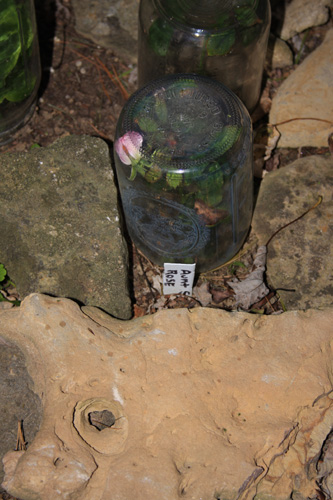
A blooming rose, grown from a favorite aunt's cutting
(*photo
credit)
November
1, 2009 Remember the Overlooked Saints
Today we
honor ALL the saints -- not just those canonized in some formal
manner. When some artists depict this day, we suddenly see a
montage of saints we recognize -- Peter, Paul, Francis, etc.
However, this is misleading. The picture should have been of your
grandmother and the vendor down the street, who was so kind to
everyone in need. Today, we honor the kindly, merciful, generous,
hard-working, loving and peaceable folks, who raised families and
scraped for their upkeep, who suffered without complaint, who
bravely looked death in the face, and who went on to the Lord by the
millions and billions throughout the ages. Close relatives
decorated their graves for a time, and when they too became feeble
and passed on, plots became overgrown, forgotten and reused. Life
went on, and the departed became a statistic.
But is that
the total picture?
The span
of living human memory is not the end. God remembers, and calls the
countless good home to heaven; the good Lord blesses them with
renewed life and gives them the gift of eternity -- something way
beyond Earth-bound memory. Their graves have crumbled, but their
good deeds shine among the company of the elect. We are challenged
to follow in the footsteps of popular saints who died in heroic
fashion. We are also challenged to realize that ordinary folks who
were faithful are also worth using as examples and even praying to,
since they are now in special divine favor. Thus, we see that
sainthood is not just for the very special and unique few, but that
special gifts are present in everyone. All have the opportunity to
gain eternal salvation and to join together within a glorious throng
-- not as single individuals apart from others, but as members of a
growing chorus of those who enter the Light.
------------------
Prayer to All Unknown Saints
Saints of
the universe, we trust you are numerous and somewhat nameless,
except within your own company. You have all the good qualities for
persevering and continuing with enthusiasm in the praise of the
Almighty. We call upon all of you to assist us in the work ahead.
We look to you, because we do not wish to compete for a limited
heavenly space, to excel over others, to stand out apart from
others; rather we come to know that individually we can be lost, but
in company we are saved. We rest in confidence that the Lord will
give us the needed grace to join your ranks -- the poor, the weak,
the ill, and those who are so often overlooked. To save our Earthly
community requires large numbers of workers imitating you in
fidelity and enthusiasm. You laid the groundwork for glory in small
and patient ways. You gave gradually of yourselves until the energy
ebbed away, and life was transformed into eternal light. You
excelled through a collective excellence; you participated with
unselfish devotion. Guide us in doing the same, for we seek to
follow your example.
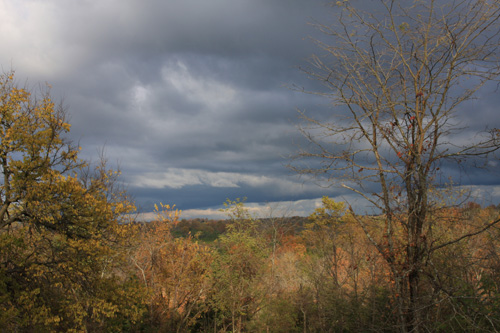
Skyward reminder of coming winter
(*photo
credit)
November
2, 2009 Pray for Those Who Passed On
For if
he were not expecting the fallen to rise again, it would have been
useless and foolish to pray for them in death.
(Second Book of Maccabees 12:44)
Average
people often wonder why this day is called All Souls Day.
They may think the name is quaint, but forget that a sizeable
portion of this world's population prays for, with, or to the dead
and a greater proportion will respect the dead in some specially
human fashion. In part, the issue of remembering the dead was taken
up on November 2, 2008, as "Diamonds in the Rough," that is, those
who died an untimely death before being polished by the suffering
that comes with the knocks of ordinary aging.
Many of
the primitive and advanced cultures respect the dead: the Mayans in
Central America, Pacific Islanders, the Chinese and Japanese, Roman
Christians in the catacombs, and on and on. Many religions base
this respect on a conviction that the deceased are still present in
some way. Honoring the dead becomes an integral part of many
cultures, though individuals within those cultures may not render
such honor. Tombs, monuments, cave writings, biographies, grave
stones, memorials, and special days of prayers or feasting are
expressions of respect for the dead. In parts of this Hemisphere
Native American tribes have blended ancient rituals with Christian
practices and traditions. A number of Earth religions consider the
spirits of their deceased as very close at hand, and accessible to
immediate conversation. Some prepare meals, bring flowers, burn
candles and incense.
As
mentioned explicitly in the Christian funeral prayers, we believe
that in death, life is not ended but changed. As Goethe says, this
life is the childhood of our immortality. Christians do differ in
whether a process of purgation may occur after death. for those not
yet purified by suffering or the toil of life's journey. All
Christians hold that a number (differing in quantity or proportions)
bask in the Divine Light -- the Church Triumphant. Actually a
majority of Christians hold that a number of people are in an
intermediate period of purgation -- the Church Suffering. The
groups of those who have arrived and those arriving plus those of us
on Earth make up a total community of faith in the Lord. We here or
beyond can assist those still on the journey -- the poor souls who
are part of one total body. Thus many of us follow the tradition of
praying for the dead (above quotation). We affirm this process of
purgation and the indication by Jesus that forgiving sin is a
process (Matthew 12:31) And I tell you every sin will be
forgiven but not that against the Holy Spirit.
Prayer: Lord, may the souls of our loved ones who have passed
on rest in peace. Please help those who linger in hospices, senior
citizen homes, and prisons as they endure their earthly purgation or
purifying; make all pure through the blood of the lamb, and prepare
them for seeing the "light," as they pass from this mortal life.
May their struggle be shortened and their rest peaceful.

Pie make from autumn-harvest apples, a home-baked
comfort food
(*photo
credit)
November
3, 2009 Create Domestic Comfort Zones
Once on
a brisk autumn day, when we were performing an environmental
resource assessment in the Northeast, we found that some residents
were using air conditioning and others heaters. That strange
anomaly occurred over and over upon closer look. "Oh no, that is not
unusual; it happens at our place all the time." Heating and cooling
the same building simultaneously! Isn't this energy waste? I have
entered some overheated rooms in winter and some terribly cooled
rooms in summer. At a car maintenance place, my remarks at over
cooling in summer found ready agreement by the accounts person,
"Yes, and that is why this heater is on near my desk." Why not work
out uniform comfort zones?
This
reflection repeats one of the practices mentioned under "Keeping
Cool through Other Practices" (July 8, 2009). However, here
attention focuses on heating, not cooling -- and the resultant
energy bills for the coming winter months. Americans often tolerate
(demand) cooler or lower summer indoor temperatures in air
conditioned space than they "tolerate" in heated space in winter. A
building will be cooled to 62-65 degrees Fahrenheit in summer, and
the same space heated to 75 degrees in winter for the very same
people showing, if nothing more, their propensity to waste energy.
The difference between what is desired in summer (62 degrees), if
followed in winter, and the 75 degrees, if followed in summer, could
save close to one-third of many heating/cooling bills.
For
heaven's sake, establish a comfort zone. Say, set the thermostat at
71 degrees. Now advance it 8 degrees as the "summer limit," that
is, 79 degrees, and cool to this temperature; now reduce it 8
degrees from the 71 medium for the "winter limit" of 63 degrees. If
people find either extreme too much, set their temperature as
required -- but adhere to it in both summer and winter. Establish
their collective comfort zone and abide by it. Then if they
find this intolerable due to being too hot or too cold, move them to
cooler or warmer parts of the building, and have them adjust the
amount of clothing worn, which common sense really dictates.
Honoring one's comfort zone year round could result in major energy
savings.
Getting
a person familiar with thermometer readings, and his or her own
comfortable feelings, is an educational task in a country that says
we must be super-cooled in summer and super-heated in winter.
Both of these are unhealthy conditions. Should we tolerate
complaints of an overly pampered people? As an important side
benefit in establishing comforts zones, studies show that residing
in higher summer temperatures and lower winter temperatures cuts the
instances of flues, common colds and respiratory disease problems.
Think of human health as part of the total human comfort zone, for
who enjoys a nagging cold?
Prayer: Lord, teach us to see the gifts You have given as meant for our
benefit but not our extravagance. Help us to take
comfort in and delight in
sharing resources with others.

A sunflower, providing wildlife food and
self-sowing seeds for the coming year
(*photo
credit)
November
4, 2009 Prepare for Copenhagen Next Month
While
the United States shares with China the role of making the world's
largest carbon footprint (together we account for 40% of the world's
total), still we Americans can be of great service by addressing the
problem of climate change as emphasized by President Obama on
September 22, 2009, at the United Nations special session. Here
are some ways that this can be done:
*
Specify a national policy of carbon reduction through a movement
towards a renewable energy economy (wind, solar, etc.) ASAP. The
current stimulus package is moving in that direction, and this must
be accelerated by a "Man to the Moon"-type program with a focus that
is equivalent to a wartime footing;
* Openly
challenge other nations to do the same, especially the developing
ones who are still enamored by cheap coal-fueled electricity
generation -- forgetting that some of the cost is borne by the world
in general, and the poorer nations in particular;
* Obtain
a commitment from the richer nations to help fund clean energy
projects in the developing nations -- and allow this to include
preserving forestland through subsidies rather than by make-believe
cap-and-trade scenarios;
*
Consider absolute caps on generation of polluting
carbonaceous fuels, and enforce these by fines for major polluters;
* Accept
biofuels in the mix provided that these truly reduce the carbon
footprint (disputed for some varieties), and do not allow biofuels
to compete with food sources and inflate prices;
* Offer
special assistance to the island nations (Maldives, etc. ) that will
be flooded by the rising ocean levels in the coming decades as more
of the world's icecaps melt;
*
Develop a program for sharing solar and wind technologies with
developing nations so they can find a more even playing field;
* Do not
be tempted to include new nuclear powerplants in the upcoming
"clean" energy mix, for these are exceptionally expensive, tempt
further nuclear proliferation, have persistent safety and waste
disposal problems, and can only operate if the government accepts
the ultimate risk of a major disaster; and
* Show a
willingness to abide by major decisions on climate change by
agreeing to an international treaty that must be approved by our
Senate -- with voters urging their senators to act.
Prayer: Lord, this planet has never before faced a crisis of such magnitude
and of our own human-making. Inspire our elected representatives to
see the seriousness of the situation and to act with urgent speed to
begin a process of saving our fragile Earth.
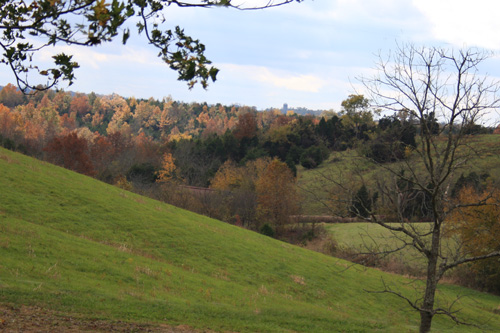
Pastoral autumn scene, Anderson Co., KY
(*photo
credit)
November
5, 2009 Know
the Reality of Instant Communications
Recently, a story was told of a teenager who had wrecked two
vehicles while texting. In one instance, she ran through a red
light; in another, she hit a truck from behind while distracted by
her messaging. When confronted, she said she simply had to do what
she was doing -- a compulsion for instant communication with
others. Her state, Utah, is forbidding such operations while
driving and, hopefully, the penalties that await one who imbibes
alcohol will be applied to this dangerous practice as well. Many
good reasons can be made for having devices that can connect with
home, loved ones, and 911 in an instant. Consumers are convinced
that "everyone" needs access to instant contact with others for
safety and welfare. In reply to someone initially shocked by my
personal lack of instant contact, emergencies aside, we can uncover
some limitations to instant communications:
Name
destruction -- An
instant is enough time to blacken someone's reputation. An
irresponsible person need only post an unfounded rumor on the web,
and this becomes a permanent entry and remains for search engines to
find. The power of such damage is immense.
Time
wasted -- People who
are in such instant chatter could be doing other useful things that
require silent space and concentration such as language study or
book reading. Today being busy means being on a phone with someone
else or simply texting.
Health threatened --
Chattering becomes a compulsion that not only consumes quiet time,
but also exacerbates stressful conditions. Overuse of electronic
devices means less time engaging in physical exercise and being
outdoors in fresh air and full spectrum sunlight; also overuse of
electronic devices can involve neck and back strain, carpal tunnel
syndrome and eye problems.
Wrong
connections -- The
improperly monitored vulnerable people can easily find links to
those up to no good.
Frivolous overload --
Instant communications means that time required to think out and
study problem areas is neglected. The individual who seeks to be
always connected to another (parent to child or inverse) is being
retarded socially and intellectually.
Ill-preparation --
We can shoot from the hip in an instant and then regret it for years
to come. The time lapse to allow emotions to cool is good for
healthy interpersonal relations.
Economic advantages
obviously exist or else why the explosion of cell phones and instant
communication devices in this first decade of the twenty-first
century (from nearly none in 2000 to an estimated six billion in use
by 2013). For instance, fishers can find markets up and down the
coast of Kerala, and thus not resort to dumping excess catch that is
unneeded at a saturated home base market; all parties prosper. This
expansion of business activity is being felt throughout the
developing world where advantages abound. ("Mobile Marvels," The
Economist, September 26, 2009.)
Prayer: Lord, our prayer is the best instant contact. More people need to
learn to use it frequently and well.
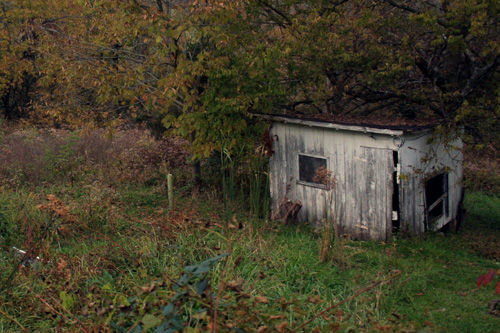
A chicken shed full of daily fresh eggs
(*photo
credit)
November
6, 2009 Take the 2009 Simple Lifestyle Test
On
World Community Day, it is wise to ask whether we strive to live
like responsible inhabitants on our planet:
1. Grow
some of my (our) food -- If we eat food we grow, we identify
with the place, control growing conditions, save transport fees, and
experience the joy of gardening.
2.
Drive energy efficient vehicles -- If we take only necessary
trips and lack easy access to public transportation, an energy
efficient vehicle can become a major means of conservation.
3.
Install at least five compact fluorescent bulbs -- This switch,
if performed by all Americans, would reduce the need for new
electric power plants to almost nil for a decade.
4. Use
appliances sparingly -- Refrain from using unnecessary electric
or gas appliances; reduce or stop television use; cut off appliances
in standby mode; buy energy-saving appliances; keep cool without
air conditioning.
5. Use
solar energy -- Where the opportunity allows, dry clothes
outdoors; install solar space, hot water and greenhouse
applications; consider solar food cookers, food dryers and
photovoltaics.
6.
Heat and cool consistently -- Often people cool to lower
temperatures in summer than they find comfortable in winter, and the
inverse with heating. Keep year-round at a medium temperature say
70 degrees F (+8 degrees in summer and -8 degrees in winter).
7.
Create green living space -- Design and build or acquire
relatively small residences, using local construction materials,
insulate well, allow for multiple use of interior space, and keep
place airy and free of toxic materials.
8.
Recycle and reuse when possible -- Disposable materials made of
paper, empty metal containers, cardboard, and plastic waste
materials should be recycled. Obtain needed clothing and home
furnishings from flea markets and yard sales.
9.
Replace lawn with edible landscape/wildscape -- Fuel and other
resources are expended in mowing and maintaining lawns; these
resources could be redirected to less costly utilitarian or
ornamental purposes such as gardening or fruit trees.
10.
Conserve water -- Most of us know most of the common ways
suggested to conserve water (shorter showers, etc.); some people may
find the major one (compost toilets) beyond current means. Water
savings equal resource savings; consider water purification and
distribution to your residence.
Prayer: Lord, encourage us to live our lives more simply.

A colony of winged ants, sensing the chill of
autumn
(*photo
credit)
November
7, 2009 Recall the Catholic Worker Founders
You and
I may never have had the privilege of meeting Dorothy Day
(1897-1980), except through her writings and through the testimony
of Catholic Worker Movement individuals whom we meet over the
years. Connie Ridge, one of Dorothy's admirers, ran a house for
homeless women in Washington, DC; she invited me to go to New York
for Dorothy's funeral, but pressing business prevented me. However,
Dorothy's life, first as a radical Communist and then as a convert
to Christianity, who never abandoned her basic radicalism throughout
a very long life, deeply impressed me. She stayed poor and was with
the poor. Her passionate devotion to peace and justice issues was
legendary. She was a devout person who did not hesitate to go to
jail when opposing war and social policies.
Dorothy
Day's legacy is the Catholic Worker Movement, which continues to
serve the underprivileged and the outcast in its rather informal and
decentralized manner. The Catholic Worker Movement is not an
organized association, and does not have any general rules or
trademarks or business logos. It has no national coordination,
salaries, insurance policies, and retirement plans, although they
are expected of modern organizations. The movement is somewhat
anarchistic to say the least. The monthly periodical, The
Catholic Worker, is still listed as one penny (30 cents a year
subscription), and has substantive articles on peace and justice
issues, along with pertinent book reviews and other topics. The
paper is produced by a devoted staff of volunteers who live in the
style of Dorothy Day. It is assembled at the St. Joseph House, 36
East First Street, New York, NY 10003, (212) 254-1640, near a
homeless shelter called Maryhouse at 55 East Third Street.
A
closely associated part of the core movement, with my closer
familiarity, is a rural counterpart to New York city's Maryhouse,
namely, the Peter Maurin Farm at 41 Cemetery Road, Marlboro, NY
12542. We were able to perform an environmental resource assessment
for this property a few years back. The farm also serves as a
homeless shelter/office complex. The farm took many of our
assessment suggestions, along with others, very much to heart, and
is becoming a greener place as well.
Peter
Maurin (1877-1949) was a farmer of French peasant stock who is
regarded as co-founder of the Catholic Worker Movement along with
Dorothy Day. The two were convinced that having rural and urban
components in the Movement was appropriate, and so Peter took his
farming skills to the Hudson Valley location. My regret is never
having met him either, since we most likely shared much in common
socially, religiously, economically and politically. Both Peter and
Dorothy remain models for many people who struggle to present
alternatives to this disjointed and dysfunctional world culture in
which we live.
Prayer: Lord, continue to furnish us with great models to
follow in a time when such a
need is so great.

Remnants of the white snakeroot, Ageratina altissima
(*photo
credit)
November
8, 2009 Acknowledge the Power of the Widow's Mite
This
poor widow put in more than all the other contributors to the
treasury. For they have all contributed from their surplus wealth,
but she from her poverty, has contributed all she had, her whole
livelihood. (Mark 12: 41-44)
In a
small village among the one million such communities in the vast
country of India, some people are turning to bike pumping and
small-scale wind power to meet their emerging electricity needs.
They are not waiting until the umbilical cord of a transmission
system reaches them; they are becoming self-sufficient through
their own efforts. Through their own skill as poor folks they are
contributing to the saving of our wounded Earth. How different from
a cap-and-trade mentality that allows some to pollute and continue
in extravagance. Many contribute to Earth's treasury with all they
have, their livelihood.
Every
time we read the story of the little widow placing the few coins
that she needed into the treasury box and hear the clinking, we are
touched. What else could we be? However, this story is repeated
many times over in many different ways: those who give themselves as
caregivers for a loved one, or donate a kidney to an unknown, or
share the meager produce of a small garden. Each contributes in a
small way, but whole-hearted giving has a power all its own. First,
small gifts give hope to the recipient; then they also empower the
giver in a special way; third they become an example for others who
hear about them to do the same; and last but not least, they
contribute to the power that the lowly have through the spiritually
dynamic act of Resurrection or new life.
Large
contributions receive publicity, adulation, and are a subtle
exertion of power, for the wealthy say that what is given is theirs
to give, and that they have the right to dictate how it is spent.
Is a billionaire really giving, or simply seeking support so that he
or she can continue to hold on to billions of ill-gotten goods that
belong to all the people? Large contributions have pernicious ways
of making recipients to be supporters of the givers, and thus ensure
that profound change will be delayed.
The very
"small" contributions from one's want or need are extremely
powerful. A freedom is exercised by the giver; a trust in the power
of God, satisfying needs and working in the world, is expressed; a
dynamic of giving totally and thus receiving totally is at work, for
from death to self comes all new life in sacrifice.
As observers
of the scene of giving, where do we stand between excessive
adulation of the wealthy and overlooking the small fry? It is far
better is to work with the small contributors and help restrict the
holdings of those who can dictate where their excessive wealth is to
go -- and do this through fair taxation.
Prayer: Lord, teach us to see the hidden and small giving of extremely generous
people, and make these the examples of how a
better world is emerging.

An old ash tree, holding fast the autumn color
(*photo
credit)
November
9, 2009 Solve the Deer Proliferation Problem
The
middle of the regular deer-hunting season is a good time to address
the proliferation of certain forms of wildlife (geese, turkey, and
deer) in this country. Proliferation of some species is in contrast
to the demise of certain native species like frogs and migratory
birds. While not forgetting the endangered wildlife problems, we
see the geese, turkey and deer populations explode. Today there are
more deer in North America than there were when Columbus discovered
America -- over ten million. Deer (and geese and turkeys) were
rarely seen in our Kentucky countryside in my youth sixty years ago,
but today they are commonplace.
Deer are
more ubiquitous than geese or turkeys, since they inhabit urban and
suburban as well as rural areas, wooded and clear areas, and sites
where there is plenty of water or little. Deer are beautiful and
graceful, but they are also carriers of disease and a danger on both
well used and sparsely traveled highways, especially at night when
temporarily blinded by oncoming headlights. Concerned citizens
address deer problems in different ways. One gardener in Wyoming
erected a sixteen-foot high fence to keep the deer out. Folks in
suburban Cleveland asked me what they could spray to keep deer from
ravishing their expensive and extensive shrubbery. At the "Midwest
Energy Conference" in 2002, the subject at one session quickly
centered on deer control. During my stay at Marquette University in
1998, a professor came in all sleepy-eyed; he said he had been up to
3:00 a.m., at the suburban city council on which he served, debating
deer problems.
Most
deer control measures such as a host of chemical repellents and
noise-making devices are only partly successful. Some people use
hot pepper sprays on deer-attracting plants; however the first rain
washes them all off. Orchard managers install netting around
sapling to dissuade deer browsing. Aggressive dogs can discourage
visiting deer, but that only deflects the problem elsewhere.
Fencing is always one mainstay though deer can clear some rather
high ones. The folks at St. Anthony's Farm near Petaluma,
California, discovered by accident that parallel four-foot-high
fence could discourage deer, which hesitate to jump because of
confusion on where they will land.
Nature
lovers and non-meat eaters may object but, short of reintroducing
wolves, culling is the easiest form of deer control. Besides,
venison is far superior to tough goose and certainly comparable to
or better than grain-fed beef, being low in fat and high in
protein. If properly prepared, deer sausage is both a treat for the
meat-eaters and a locally grown food. Furthermore, hunting need not
be merely for pleasure, but a re-establishment of nature's balance
where common predators are absent. And hungry folks like low-priced
venison.
Prayer: Lord, teach us to be practical in all things, both
striving to save the endangered species, and to balance the excess
of certain wildlife species in our midst.

A lone oxeye daisy, spotted in early November
(*photo
credit)
November
10, 2009 Observe International Week of Peace and Science
November's Veteran's Day is an ideal time to consider beating
swords into plowshares. This is a time to remember those who most
hated war and sought a lasting peace for our troubled world.
Science and
technology can be promising in working towards the goal of peace:
*
Energy research in coatings could facilitate the production of
low-priced photovoltaic energy that could compete with electricity
generated by coal-fired powerplants. Potentially, the solar
coatings on rooftops or other hardened surfaces could generate
sufficient electricity to make centralized powerplants obsolete --
as will most likely be the case by 2050. Lower costs for
wind-generating equipment and further research in a future hydrogen
economy are other fruitful areas of study;
*
Drug and medical developments could be the cure for a wide
variety of unconquered diseases. Malaria and many tropical diseases
could be attacked, and the toll of one child dying every six seconds
from preventable diseases could be halted, if resources were focused
on curing and healing those already affected;
*
Security surveillance, through rapid and low-invasive personal
identification procedures and monitoring systems, are open to
technological breakthroughs and to making the world safer;
* Food
safety monitoring, especially with regard to the vast volume of
imports from other nations, is a high priority in this country --
and proper screening and decontaminating procedures are to be
perfected and installed;
*
Disarmament procedures to detoxify and completely destroy
chemical and biological weapons and the nuclear stockpiles should be
implemented so that terrorists do not have access to them;
* Aids
for the physically challenged, need a close coordination of
science and technology. Some of the improvements such as allowing
computer and Internet access to the blind are truly marvelous. One
could also add all types of educational improvements for the
mentally challenged as well; and
*
Low-priced water purification systems are needed as potable
water becomes a growing problem in rapidly urbanizing areas. Systems
must extend beyond small scale purification of drinking water at
residential levels to include desalination of vast quantities of
water needed for irrigation for the production of food for a hungry
world.
Prayer: God, all Wise, make us turn our collective attention away from weapons
of war to the fruitful task of bringing peace, a noble undertaking
far less costly than a trillion dollar world weapons program, and
able to employ far more people in more
meaningful work opportunities.
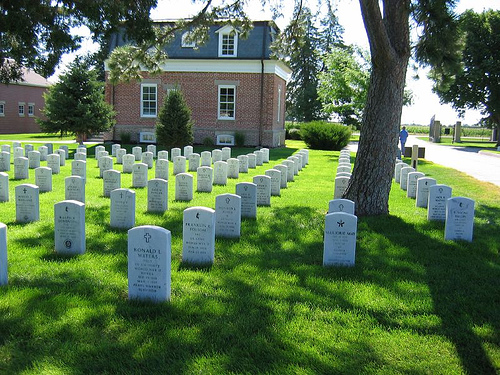
Fort McPherson, a United States veterans'
cemetery
(*photo
credit)
November
11, 2009 Honor War Veterans
Vince
was a war veteran who would regale anyone who visited his Frankfort,
Kentucky, home with stories about his adventures in Europe during
World War Two. More than just talkative, he was enthusiastic in his
narration of those stories. And he had a written collection of
episodes, which described much about his character and conduct
during the liberation of France and Germany in 1944-45. What a
veteran! After many fruitful senior years assisting others,
especially youth, he passed on to the Lord.
Today we
give special attention to Vince and all war veterans. Armistice Day
started as a special occasion in 1918 at the end of a "war to end
all wars." But unfortunately we have experienced other conflicts
since then -- World War Two, the Korean War, Vietnam, the first Gulf
War, Iraq and Afghanistan -- some count sixty global conflicts in
sixty years. War veterans deserve remembrance, for they risked
their lives for others. Recently, an Iraq war veteran came to my
door and asked for food. It struck me that while we make an effort,
Americans so often overlook the welfare of their veterans. Lately,
the federal government has done a better job with veteran hospitals,
educational packages, retirement benefits, burial expenses and
cemetery places. Many do not join the pressure groups seeking
veterans' benefits. Perhaps that is because veterans differ as to
whether they want to relive their military experiences. For the
sake of their mental health, some strive to forget the wartime
episodes. Only in recent years has medical attention been directed
to assisting those who have been mentally affected by warfare.
Now over
one thousand World War Two veterans well into their eighties die
each day -- and the services of honor guards are in great demand.
The last Civil War veteran died in 1955, and now the last of the
World War One veterans is being laid to rest. Thus glory passes!
In turn, each war's group of veterans gathers for graying and
thinning reunions. I recall, when in studies at Fordham University
in the 1960s, observing a mustering of a few New York area World War
One vets -- and it was a sad looking group. Unfortunately, the
total veteran ranks seem to be replenished with each successive war
and we have had too many.
War
veterans express a sense of fidelity and willingness to sacrifice
for the common good of our country; they have risked life and limb
for others -- and are worthy of our deepest respect. If we are to
heal our Earth, we need people who are willing to sacrifice and
devote some of their time for others -- though hopefully not in
harm's way. The struggle to save our wounded Earth is just as
important as any of the foreign wars America has fought. We need
people who can become the new veterans who "wage peace." Let's
listen to Vince's stories and profit from them.
Prayer: Lord, teach us to respect the veterans who risked
much for what we so often take
for granted.

Ginkgo, a blind and happy black labrador
retriever
(*photo
credit)
November
12, 2009 Consider Cap-and-Trade as Claptrap
The
utter arrogance of those who think they are green and can trade with
the pure air that belongs to all of us as commons is disappointing.
This exploitation forces some of us who still want some form of
social justice to side with those who still see a "socialist behind
every bush," and will oppose any chance to reduce pollution -- which
requires governmental intervention. It is the trading that
disappoints us, not the possibility of caps; the "capping"
means defining a misdeed and making culprits pay fines until these
activities are eliminated. The "trading" is the enticement to Wall
Street capitalists who are bankrupt in thought but who seek ever
greater bonuses; they are fast on the road to bankrupt the nation
and world unless they are forced to return their ill-gotten gains.
Many of those who support cap-and-trade are friends of Wall Street
who just might be the "traders," and possibly make a fortune on the
deal, along with "environmental" lackeys who still think the market
can solve it all. Unfortunately, they also have the ear of the
present administration that wants an energy bill passed as soon as
possible.
Such
trading or exploiting of the resources of the commons has been going
on far too long -- hundreds of years. We must reclaim the commons,
and the last who should have their hand in the reclaiming are the
traders who have messed up this world through their greed and
insensitivity. If polluters are wrong -- and they certainly are, --
they should not be able to buy their way out of the mess, but rather
they should pay. Call it what it is, a tax or a fine. This is far
too late in the game to allow the exploiters of yesteryear to
continue in the conn game of taking and be legally protected in
their takings -- whether gold or beaver furs or cod fish or oil or
pollution "credits." Haven't we grown just a wee bit in these
hundreds of years to know a thief when we see one?
An
absolute cap as the Sun Day joint letter by a host of activists
state is simply different. This means that each major polluter is
required to conform to the best technologies for clean production of
electricity or use of fossil fuels, and that any exceeding emission
limits will have to pay a fine or tax. Trading so polluters can buy
time is a perfect shell game, for it either includes groups that do
not and will most likely not pollute, or who say they will clean the
air through a budding forest that has no guarantee of maturity. No
one should pay another to pollute; everyone should pay for
polluting, and the payment must be to the commons, the people of
this Earth who have or will suffer from the climate change resulting
from the extravagances of the polluter. Some say the consumer will
pay higher energy prices, but energy conservation and renewable
energy really save and provide benefits -- and all are
beneficiaries, including the air and water commons.
Prayer: Lord, teach us not to be sucked in by false promises, but rather to do
the right thing. Help us to call a spade a spade, to look out for
all including the global commons, which we all need in order to
benefit from a higher quality of life.
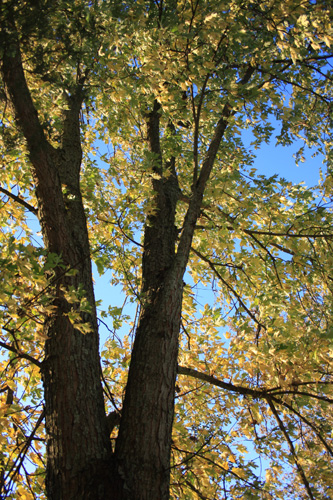
Blue skies
(*photo
credit)
November
13, 2009 Set a Swords-into-Plowshares Course
We
Americans have inherited from previous mind sets and circumstances,
not the splendid isolationism of earlier America, but the onus or
responsibility of being the "police force of the planet." However,
this more recent policy deserves periodic review, since a good
application of the principle of subsidiarity is that each community
at whatever level should be in charge of its own welfare to the
degree possible. Nevertheless, some issues transcend the ability of
a local community, e.g., pandemics, natural or human-made disasters
of various sorts, climate change, globalization issues, etc. As a
nation we must be involved -- but we do not have to act alone any
more than in peace keeping.
In
September, President Obama chaired a UN Security Council meeting
that voted 15-0 to start a process of working towards an ultimate
goal of eliminating the world's stockpile of nuclear weapons on an
enhanced timetable. This is a must in preserving the peace of the
world just as much as closing the Guantanamo internment camp,
halting F-22 fighter production, reducing the fleet of British
Trident-type submarines, closing unneeded military bases, and
ridding our country of chemical weapons. Often acts of closing down
outmoded and outdated weaponry meet with resistance by communities
faced with job losses and economic readjustments.
But a
deeper issue emerges: why shouldn't outmoded and uneconomic
military industries or bases be closed for the common good and the
need to turn swords into plowshares? The determinations are made by
impartial observers, and the decisions have been accompanied by
recommendations to members of Congress, some of whom wallow in the
pork barrel. The local political clout of the senators and members
of the House of Representatives seems to be at odds with the
national and global good of closing unneeded military
establishments. Voters must move past special interests and
encourage their elected representatives to vote for what's best for
the country and world.
As a
nation, we have become far too dependent on the military -- somewhat
like a chemical or drug dependence. Interest groups are good at
lobbying for pet projects. Closures need not be bad news,
especially when land, materials and financial resources are now
freed up for peacetime uses. However, peace-making opens a host of
job positions that may not be as lucrative as military enterprises,
but can be quite fulfilling. Few resources are given to opening
lands for training peacemakers in a variety of capacities (see
"Peace Corps and Volunteers," October 14, 2009), for training
overseas specialists, for basing and locating disaster relief
workers, and for researching and testing materials to be used for
appropriate technology both at home and abroad. Preparing for
worker retooling is just as important as shutting down military
facilities. Thus closure plans should become conversion plans.
Prayer: Lord, teach us to be peacemakers and to see the benefits that accrue
to all by being so.

A sky that speaks of winter
(*photo
credit)
November
14, 2009
Make America Recycles Day Meaningful
Tomorrow
is America Recycles Day. Has the term "recycling" gone out
of style even before it has acquired its full effectiveness? Today
we consider not just what we are doing individually, but what our
community, state and nation are doing to reuse materials. Most of
us recycle a few things, if nothing more than donating clothes to be
reused by another. Some are in communities that require recycling
of a host of materials (metal, glass, newspaper, cardboard, and some
plastics). Much depends on regulations, convenience of pick-up
services, accessibility of drop-off points, and even the incentive
of money for such conservation measures. Unfortunately, "recycling"
is a chore, and inconvenience simply does not always grab our
imaginations.
I grew
up before the advent of consumer plastics, and before the word
"recycling" was a common term. Yet on our farm we were almost total
recyclers. Wood wastes and paper tinder were burnt in fireplaces
and used for plantbeds, glass jars reused for canning, ashes
scattered on garden areas, clothes passed on to more needy families,
food wastes fed to dogs, hogs and chickens, manure and agricultural
wastes spread on the fields, rocks (limestone) crushed for pasture
land, and wire and other metals reused to reinforce concrete or to
be refashioned in the blacksmith shop into metal items. Virtually
nothing went without being recycled, because it never left the farm,
where neatness was a virtue demanded though not always totally
attained. We were not perfect, for we filled our sinkholes (in a
limestone and karst region) with some unusable glass products and
building materials.
The need
today is for each citizen to regard it as his or her duty not to
allow things to leave the premises without their reuse or disposal
being responsibly designated. If this were the case, we would
reduce the waste materials considerably. We would sort our waste
materials and take them or ensure that they get to recycling
centers. Currently, our local recycling center is just two blocks
away and this center takes plastics, metals, three types of glass,
newspaper, and cardboard. Our church takes unused clothing and
other household materials, and these sell well at very low prices to
those in need. All my food peels and other organic wastes are
composted in the garden area. We strive to make a conscientious
effort to reduce landfill-bound materials.
A
national recycling policy could reduce wastes and the energy needed
to process virgin materials. Actual subsidies or tax relief ought
to go to recycling centers, since profitability is marginal except
on a high volume. Methane generated at landfills could be
utilized. The return of the deposit on beverage containers would go
a long way in cleaning up the countryside and reducing the waste
volume. Municipal garbage could be composted and used as soil
supplement in specific locations.
Prayer: Lord, teach us to use all things wisely and to see that nature has no
wastes; nor ought we.

Leaf of the silver maple, Acer saccharinum
(*photo
credit)
November
15, 2009 Learn Lessons by Observing
Learn
a lesson from the fig tree. When the branch becomes tender, you
know that summer is near.
(Mark 13: 24-32)
The Lord
tells us to be observant, to be open to learning from the things
around us, to know what is happening, the seasons and the changes in
conditions. Often we overlook Jesus' teaching point, and consider
only a few people such as naturalists, investigators or insurance
adjustors to be keen observers. Jesus is saying that ALL of us must
do the same, and be open to the lessons that the things around us
teach us. Today, our fig trees are the forests undergoing dramatic
defoliation. Change occurs.
Observation is called for at the personal level so that in
the prophet Daniel's words we can be wise and "shine brightly like
the splendor of the firmament." The past was not perfect for us;
the future can be better. We each have a dissatisfaction with the
immediate past, whether within our individual lives or our relations
to our family. Improving these relations takes observation, for
nothing stays stationary; change is always in the air as people
grow, mature, rebel, get sick, age and need help. With the grace of
God we can go with the flow, ride with the tide.
Observation comes at the community level where we are uneasy
at the way things are going around us. We can close our eyes and
deny things are going awry; we can excuse ourselves by saying the
neighborhood must be cared for by others; we can escape into our
own allurements or be reduced to silence. Or we can observe and
then act as good citizens. Observation is only the first step, but
spirituality rooted in sacramental life leads to action.
Observation at the national level is more disconcerting, for
the more we get away from ourselves in the concentric circles that
make up our lives -- personal, family, community, regional, and out
to this national level -- the less we seem to have a power to
influence events. However, it may be the other way around. If we
influence another, then a reaction will occur that will affect far
more people. Public witness has an effect, whether it be a bumper
sticker or a well phrased question at the right moment.
Finally
observation is needed at the global level. We know that
climatic changes are occurring all around us. Glaciers are melting,
oceans are rising, forest disappear. This is the end of the ages,
and Christ comes in the final seconds of the Earth's geologically
age; his second coming is soon to occur according to such a
perspective. There is a sense of expectancy, like that of the family
awaiting a soldier's return from war.
Prayer: Lord, we give You thanks for the eyes of faith to see,
and the will to make the changes that this season entails. We
prepare as Thanksgiving Day approaches, to find that all things are
gifts from You, even this moment of grace to determine changes
needed for ourselves and our world.

A lone black-eyed susan in
November. Anderson Co., KY
(*photo
credit)
November 16, 2009
Consider Ten Ways to Make Churches Greener
Parishes in harder
financial times and with a mandate to use God's gifts wisely need to
be greened. However, this is an ongoing process. The following
suggestions are not merely theoretical; we have effected them in
either or both of my parishes:
a) Use energy efficient
light bulbs in all areas, especially for most often used lighting;
b) Turn up the cooling
temperature in summer and down the heating temperature in winter. A
hot water tank has been replaced in one residence by
energy-on-demand devices along with clothes washing with cold water
-- and the presence and use of clothes lines;
c) Change greenspace to
"edible landscape" by planting areas in trees (apples, plums,
peaches, pears, nectarines, cherries and mulberries) and garden
varieties (thirty types of vegetables, herbs and flowers, including
permanent patches of mint and strawberries). One parish has cut the
greenspace in half. At the other parish the demand for blacktopping
for increased car parking was resisted and these areas have been
left in greenspace along with tree plantings;
d) Use energy efficient
vehicles getting at least forty miles to the gallon of gasoline.
Likewise make an effort to carpool when possible to distant meetings
and events;
e) Halt the use of
domestic air conditioning and retain large shade trees that keep
residences relatively cool in summer;
f) Install and utilize
rain catchment systems -- existing cisterns and rain barrels on
outbuildings (work in process);
g) Use permanent
glassware, silverware and dishes for meals when possible, though
this has not yet been implemented here for major events that include
carry-outs;
h) Add insulation through
energy efficient windows (more are in process), new
roofing materials, and rugs in older home residences with drafty
floors;
i) Recycle all paper,
cardboard, several types of plastic, metal containers, and clear,
green and brown glass. Also institute monthly sales at low prices
of clothing and some household items, which assist the lower-income
local community folks; and
j) Distribute food with
care. Here food handouts are generally made through the community
cooperative efforts of a "food pantry." However, extra food is
distributed in hardship cases, and this involves principally
nutritious, non-processed basic food. One parish runs a
food-purchase and cooking or "Kitchen" school.
Prayer:
Lord, give us the courage to do what we preach.

A migrating flock, heading
to the South for winter
(*photo
credit)
November 17, 2009 Take
Seriously Geography Awareness Week
Geographic illiteracy is
rampant in America -- and perhaps elsewhere in this world, for all
beyond the local neighborhood and towns. As many as half of
Americans could not name the various states on a national map. Can
you name all the state capitals? The major river systems? The
major Interstate routes and their origins and destinations? Can you
identify all the capitals of the G-20 nations? The major sports
teams and their host cities? Just how good are you at common
geography? What about Jim, the New Englander, who told me he
thought Buffalo was where bisons roam; he boasted of having never
crossed the Hudson -- after being three years in New York City's
Bronx.
On major travels we are
moved to read the maps and figure out our upcoming itinerary, though
"Mapquest" and other Internet services will do the job for us, with
specific verbal directions, exact mileage, and even a trip map that
we can print off. That is geography made too easy, even though it
can save time, and give us the best current route. It has much the
same effect as a "Spell Checker" for a lazy speller, and makes us
focus on the route and overlook the places we pass through or near
from starting point to destination. If done well using maps, travel
is a basic way to improve our local, regional, national and even
global geographic skills. This can become an entertainment or
business mode giving us a sense of places, which may remain in our
minds long after the trip. To a lesser extent so do travel books
and stories, video and audio tapes, educational tv shows, and
movies. Some people do enjoy maps. Inspect our draft of the
Ethnic Atlas of the United States on this website.
My boast to others is to
be able to travel to within ten miles of where 90% of Americans live
without using a map. That means using the Interstate system and
major U.S. highways to reach the populated areas. The catch of
course is the other 10% composed of scattered rural areas, and the
difficulty involved in the last 10 miles, especially in major
metropolitan areas. While the boast is nice, it can also mean
taking some traditional routes, but temporarily hindered due to
construction, because we neglect to consult roadbuilding and detour
advisories.
Geographic awareness
gives us all a sense of where we are, the great expanse of America,
the diversity of places, proportional state and regional distances,
scenic beauty, local history, and interconnectedness of
populations. What we hear in the news makes more sense, if we know
where the places named are located relative to others. From an
ecological standpoint we learn mountain barriers, river watersheds
and general climatic conditions. Our national consciousness is
related to the geography of place, something well worth the time
needed to familiarize ourselves with maps.
Prayer:
Lord, help us to want to know where we are, so that we can better understand where
we are ultimately going.

A bare tree, waiting for
winter's chill in Kentucky
(*photo
credit)
November 18, 2009 Be
Prepared with ICE: In Case of Emergency
Since only one-quarter of
Americans carry details as to who to call in case of an emergency
(ICE), it is wise occasionally to think about such matters. No, we
do not expect a serious accident will happen to us, still we just
might be wrong. In fact, I discovered that upon looking into my
billfold in preparing this, that the phone number of the person to
be notified had become illegible. Still when many of us hike, we do
not carry personal identification -- and we could be hit by a car or
have a heart attack. The concept of updating an ICE goes well
beyond a standard address book. Who knows when something might
occur requiring that our next of kin be notified? And so our
attention involves caring for those who are to find out about our
mishap -- not just us.
The ICE information should
be prominent enough for first responders to have quick access. This
idea was promoted after the London bombing disaster in mid-2005, and
allows contact of the next of kin to obtain valuable medical
information. A British paramedic, Bob Brotchie, encouraged people
to enter emergency contacts in their cell phone address book under
the name "ICE" along with alternative contacts such as "ICE2" and
"ICE3." In an emergency situation, ambulance and hospital staff
will then be able to contact these persons. It's so simple that
everyone can do it -- at least everyone with cell phones. Other
steps could be taken by people who only use stationary phones. Even
the posting of passwords to a computer with proper people is of
great importance, for otherwise such computer records remain
inaccessible.
This brings one to another
ICE measure, and that is preparing for funeral arrangements long
before the hospice worker appears. A notice left somewhere as to
particulars would be most helpful for those burdened with preparing
our final arrangements. Our practice within the Society of Jesus is
to spell out details (burial instructions, notification lists,
songs, homilist at a funeral, pallbearers, and preferred place of
burial, etc.) and to make duplicates and have them filed with a
person who will be responsible for arrangements. This sheet should
be updated every five years, since preferences and circumstances
change with time.
Living wills are another
matter, as well as property wills and other such last testimonies.
Even to write about this, makes me fully aware that a number of
designations of my writing materials have not been completed. Yes,
at the start of this year my intention was to spend a few hours each
month on compiling a method for others to follow with ease in
routing materials. We all have a habit of leaving this to a future
date -- and sometimes the postponement goes right up to and includes
the ICE event.
Prayer:
Lord, help us to take our vulnerability and mortality seriously, at
least for the sake of those who will have to be responsible for final
preparations. Emergencies do happen to the least expecting -- and
that all to often includes US.

Unidentified mushrooms on
the forest floor
(*photo
credit)
November 19, 2009 Make
It Yours: Use Less Stuff Day
Why constantly bring up
the need to halt acquiring and storage of unnecessary stuff? The
reason is that "stuff" has a way of retarding our growth in
environmental consciousness in very subtle ways. Stuff costs money
to acquire and maintain. We seldom think of just how much of what
we buy in order to have enough to meet essential needs is junk. To
earn the funds to make such purchases takes more and more of our
lives. Boaters and camper owners spend much time paying off the
bills for big ticket items. Those who have extensive credit card
debt must ask some basic questions about our frequently overstuffed
areas:
Foods: Do we need
so many items in the pantry? On the dinner table? In the
refrigerator? Do we tend to consume less by buying a more limited
number of items from lower-priced stores (example the Save-A-Lot
chain) handling a smaller variety and fewer brands?
Household cleaners:
Do we need all the various brands and varieties or can vinegar,
ammonia, a box of soda and a basic cleanser be sufficient for most
jobs?
Paper materials:
Do we share books, periodicals, and other printed materials with
like-minded people? Do we reuse the backs of pages as scrap paper?
Containers: Do we
reuse containers when storing or purchasing items? Do we buy bulk
products so as to reduce container use?
Energy conservation:
Do we curb use of lighting, cook in larger batches, heat and cool
within wider comfort zones, and turn off unused electronics? Do we
use renewable energy? Do we get rid of electronic devices that are
cluttering the place?
Water conservation:
Volume wise, water is the stuff we use most of -- and that can
certainly be essential use. Do we use only the water required for
brushing teeth and washing larger and less frequent loads of clothes
or dishes
Gardening: Do we
practice organic gardening that uses no commercial (non-natural)
chemical pesticides and similar plant-growth-related materials? Do
we grow more of our own food?
Cosmetics: Are we
willing to omit unneeded beauty products and perfumes? Do we see
that stuff makes us unpresentable?
Transportation and
Rest: Do we refrain from travel so as to rest? Do we see that
much can be done in the free time that less travel entails? Isn't
having stuff the reason we want to escape and get away from what
clutters our lives?
Prayer:
Lord, give us the insight to see the disadvantages of a
materialistic culture, the way that things direct our lifestyle
choices, and distort our aspirations for a better quality of life.

The mid-autumn sky, with
almost-full moon
(*photo
credit)
November 20, 2009
Consider Mid-Autumn Verse
An
Autumn Message
A change confronts
us, a whisper, a hint,
Dawns come later,
evenings soon spent,
A profound stirring
in nature's fraternity,
Breaking summer's
seeming eternity.
Crimson, scarlet,
rust and gold are seen,
mixed with verdant
pastures and evergreen,
to form a grand
finale, a season's clue,
the ebbing of
life's cycles which are renewed.
Smells of fall ‑‑ dry
decaying leaves,
pungent wood smoke
hanging at the eaves,
iodine-like black
walnuts out to dry,
The scent of
mothballs, one can't deny.
Soundscapes tell the
time ‑‑ the swish of birds
in winter flocks,
the cawing of crows ‑‑ avian words,
the screech of debris
that the raker claims,
the yell in unison
at the hometown games.
One can taste the
change ‑‑ picked tomatoes hardly hale,
replaced by
endive, turnips, mustard, kale,
and pumpkin pie,
squash, pears, mince meats,
and fresh‑pressed
cider and other apple treats.
Feel the chill,
sense the autumn sun at noon,
tempt one's lunacy
by the harvest moon,
Goblins, spooks,
witches everywhere
foreshadow the
coming darkness we fear.
We hastily do the
chores of fall ‑‑ antifreeze,
chimney‑cleaning,
caulking, cut fallen trees,
stacked woodpiles,
roof patches, roadway rock.
and that annual
turning back the clock.
Our senses tell us
something's on the wane,
as nature's cycle
cuts into our own fast lane,
that summer's
flowers must wilt away,
and our bloom of
life has had its day.
If fall must come,
then let it be,
a time to hear,
smell, taste, feel and see,
and give thanks for
seasonal friends,
gently announcing
our own earthly ends.
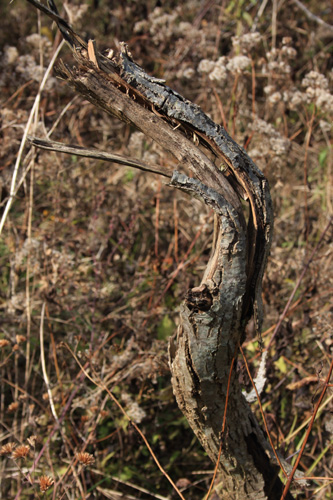
An interesting twisted stem
(*photo
credit)
November 21, 2009
Support the World's Poor
How many of us can fit
into the shoes of an African mother who sees her son or daughter
dying of a preventable disease? Are we as helpless as she is
obtaining access to a proper health facility or treatment? One of
this week's BBC nightly news broadcasts has a relief official saying
that one child dies somewhere in the world of a preventable disease
every six seconds. Incredible! That would come to five and a
quarter million infants each year, none of whom were able to reach
maturity, much less old age. The cost of saving one quarter of that
number of children is estimated at a little over three billion
dollars and is being raised by a coalition of groups to buy treated
netting to prevent malaria for over one million Africans. Think of
that amount; it is the same amount that the financially troubled
Merill-Lynch gave as bonuses when entering the deal with Bank of
America. The bonuses of one company alone could have saved the
lives of over a million children. What is the Lord going to say to
us all on Judgment Day? Why didn't we see priorities?
The manner in which this
and other rich countries treat the so-called "legal" property
holders is an utter scandal. Why a scandal? Because the wealth of
the world belongs to all, and especially to those in basic need. If
resources cannot be freed for such essential needs as food and basic
medicine, the term "cannot" really means that the laws are
fashioned to favor retention of wealth by the influential elite of a
given country. Actually, democracy means looking out for the will
of all the people, not the privileged few. The most basic want on
the part of the billion hungry people of this Earth is for food, and
then move a step more and include medicine as well as employment and
basic education.
How can we in a democratic
society stand by while our poor brothers and sisters suffer? Some
people are moved to spend time after retirement or when able to
assist in local services for the poor (soup kitchen, homeless
shelter, etc,). Others of us can share our food budget with an
organization that cares for orphans in a foreign land (my preference
is the Catholic Near East Welfare Association (CNEWA). Others
prefer to financially support relief organizations that seek to
provide basic needs to the world's poor. Concerned citizens should
contact legislators by letter, email, phone or personally in order
to provide more international relief from wealthy to poorer
nations. Maybe the financial reforms that halt those bonuses is
your area of concern, namely a tax on excess wealth so that
governmental agencies can have resources to assist others in need.
Seek congressional legislation to expand the Peace Corps to include
training people in developing nations. Launch out into the deep,
for we cannot stand silently by while such disaster comes to so many
of our brothers and sisters.
Prayer:
Lord, inspire us to speak up for the poor and to find the best way
to help them according to our own resources.
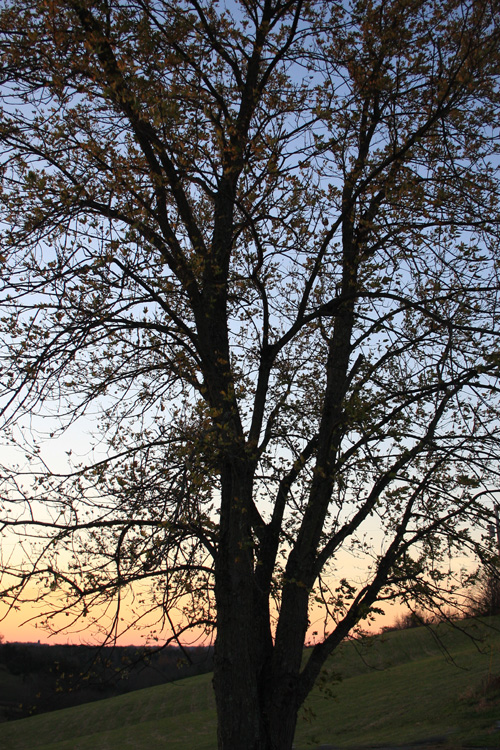
Shapes of an autumn tree
(*photo
credit)
November 22, 2009 Act
Kingly with Christ the King
Yes, I am a king. I
was born for this. I came into the world for this: to bear witness
to the truth, and all who are on the side of truth listen to my
voice. (John 18:37)
We Americans are steeped
in a republican tradition that lacks kings of any sort. Yet today
we join the rest of the world in celebrating the feast of Christ
the King, as our Church year draws to a close. We can join an
alternative crowd from the one that greeted Jesus on Good Friday,
for "we have no king but Christ." Being without a national tradition
of royalty means we are unfamiliar with nobility and all its
trappings, bows, and titles. However, such royal practices are not
what Christ means, and so, if we lack these, we may be well along
the road of redefining kingship just as Jesus was before Pilate.
For Christ, the leader was not someone out and above others, but one
who is of service and is up in front of them, an integral part of a
body working for the good of all. The emerging divine meaning of
kingship does not include privilege or elitism, and we should never
allow it to be so.
People who are more
commoner than elite can be of greater service in the manner that
Christ encourages us to be. Perhaps the service of citizen militia
in the Revolutionary War is closer to what Christ wants than a noble
at the service of the king or queen.
This commoner image has a
number of advantages: we are willing to take on the humblest role
for the good of all; we do not see ourselves as using energy and
time engaging in tasks that only set some apart from others; we can
stay focused with the work ahead; and we are willing to work closely
with others who are working as one body of Christ.
This more modern and
republican concept of kingship allows us the freedom to go beyond
finding Jesus answering to Pilate; we, as other christs, must
practice a certain independence; we need to define our own roles in
the "kingly" work of service, something that comes through our
Baptism and the gifts from the Holy Spirit at our Confirmation.
Thus we cannot act alone, but we have to make independent decisions
while we act. Such freedom includes good and bad qualities, for
some would say, "You are acting alone; how dare you not follow the
king." The response is that our king, who cleaned out the Temple,
changed the character of our relationship to a given culture: he
acted counterculturally. So too we are expected to do the same in
our own age and place. As followers of the Lord, we are expected to
do what has to be done here and now. We are to be good citizens;
we are to take care of each other and our environment; we are to be
watchful and on the lookout for those in need; we are to question
the privileges of the wealthy, who by their possessiveness seek to
control the distribution of what is common to all, and is needed for
the basic livelihood of all. Acting in a modern kingly fashion is
not easy to do.
Prayer:
Lord, teach this unkingly people how to faithfully follow according to the kingly
mandates of our baptismal vows.
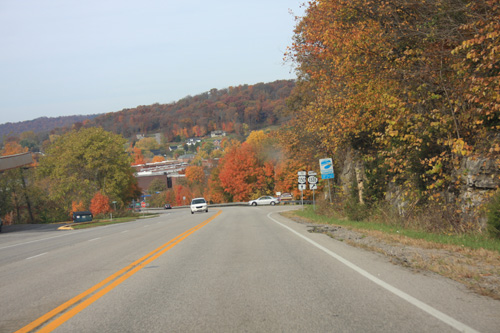
An autumn drive through Mt.
Vernon, KY
(*photo
credit)
November 23, 2009 Drive
Smart This Thanksgiving Weekend
Thanksgiving holidays are
America's finest way to celebrate. Nothing can crash that
celebration faster than a "crash" of some sort whether a collision,
with fatalities and hospitalization, or a fender bender. The
following suggestions are meant for all who travel by means of
private auto -- including this writer:
* Never use a cell
phone when driving. Keep that as a personal axiom. Tell loved
ones you will call them from the next rest stop. Sometimes it is
not we, but the other fellow who is driving erratically because he
or she is on the phone and not concentrating on the road. More and
more states are addressing this growing problem through outright
banning of cell phone use by auto and truck drivers -- some of whom
seem to be tweeting while driving. When people call you and you
know they are driving, make it curt and short saying we do not
converse with distant drivers.
* Drive defensively.
There is an absent-minded driver out there trying to remember
everything that needs to be done before taking the Thanksgiving
trek. This person could do something unexpected and so be on the
look out. It has happened to me on several scary occasions,
especially when someone fails to give a signal. Remember that some
people are doing unaccustomed heavy driving this week.
* Pull off the road
when tired. All of us know that it is too difficult -- and
dangerous -- to drive when sleepy. Don't fool yourself. The world
will remain a better place if you take that quick nap that is the
true pause that refreshes. With experience any of us drivers find
that there are ways to stay more alert: a dose of caffeinated
beverage, popcorn, an open window for a few moments in brisk
weather, loud music to which you are unaccustomed, and another
driver to change places with you.
* Know your trip
directions. Nothing is worse than not being certain where one
is driving. Study the directions ahead of time, look up the exit
outlet prior to the one needed, and place the listing on the dash
for use when traveling in unfamiliar territory.
You may have your own tracking
device and that can help, but learn the directions anyway before you
start.
* Give some time to
prayer. Asking for guidance and strength when the trip begins
is a good practice. Some like to say vocal prayers on the trip.
Thank God after a successful trip as well.
* Let others drive
difficult portions. Some of us are losing the skills we had in
earlier years and so we will not drive in certain highly urbanized
areas. It is too stressful. Seek to avoid heavily congested areas
if possible.
* Drive within the
speed limits.
Prayer: Lord, may
the protecting spirits guide us on our trip.
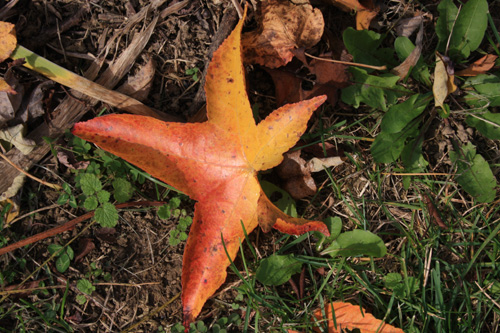
Bright leaf of the sweetgum
tree
(*photo
credit)
November 24, 2009
Celebrate National Family Week
Thanksgiving is a family
feast, and so we naturally turn to family support at this time of
overly stressed family life. For some of us, the focus will involve
entertaining the loved ones returning to celebrate the Thanksgiving
meal and gathering; for others who are the travelers it is to bring
a smile and good wishes to the one who acts as host or hostess.
Certainly Thanksgiving is good for families ultimate or extended,
who are able to gather and celebrate. But what about the broken
families of this world? Can we do something for them?
* Communicate.
Greetings to the ones who are stressed the most, or who are isolated
may come in the form of letters, phone calls or emails. While most
families are able to get together, still others have duties or are
hindered from gathering and ought to be remembered. Maybe these can
be located and assisted.
* Visit another.
Some people are shut-ins and lack the personal visits that mean so
much, especially during this week when they will miss the
Thanksgiving with others.
* Undertake citizen
action. Work for a health reform package that includes all
Americans. When one in six are not insured, they are outside the
"family" of care, and feel the isolation. Our support of
comprehensive health care is the best we can do to make them all
part of the family. The same holds for support of affordable
housing and equal educational and job opportunities.
* List the
anniversaries. Some time this week recall whether the listing
of anniversaries and birthdays is marked on next year's calendar.
That ought to be done before it is overlooked.
* Give personal
encouragement. Say a good word to those near and dear who
struggle with family problems: meeting bills, facing indebtedness,
passing exams, dealing with drugs, limiting television and texting
time, and many other concerns.
* Serve others.
This is the one week of the year when the volunteer services may be
most needed. So often we think of the holidays ahead and where we
travel and our upcoming entertainment.
However, others hurt in many
ways and they need our help. Look, see, rise up and do something.
* Pray together.
Quite likely this is a practice that is neglected because of busy
routines, and yet closeness demands that the Lord be with us in our
activities as a family. By praying we discover a great difference
in our lives and a spiritual dimension that is so often missing.
Prayer:
Lord, help us to expand our view of family and see those who are
near and dear, and those far away as part of the entire human family to which we
are committed to becoming closer.

Late autumn with green Eastern redcedar
(*photo
credit)
November 25, 2009
Inventory Our
Service Potential
God gives us many gifts
some of which have not been actualized. If tomorrow on Thanksgiving
Day we list the gifts given, how about considering our "potential"
one that are there to be triggered into action? "What can we do in
a better way to change the world?" A thorough personal inventory may
be necessary and, like any assessment, may require advice from
others.
A first step is to review
the possible areas of service open to you that attract you in some
fashion. What type of local service can be easily performed
according to where you are at this period and the amount of time and
energy available? Are your interests on a broader level such as
state, regional, national or global arenas? If the condition is one
of being incapacitated, do your interests lend themselves to
communicating with those in need or associated caregivers and
telling them you pray for them?
Second, list your
personal talents, skills at delivery or writing, amount of available
time, ability to travel to the site of the activity, and sufficient
knowledge about or access to information about the service to be
rendered.
Third, list the excuses
that could crop up as to why not to involve yourself at this time in
this service-- lack of money or time or personal support. Perhaps,
a better approach than a full time commitment is starting with a
shorter span of time and seeing whether this could be beneficial to
all parties before the investment in a long-term commitment.
Fourth, lack of experience
or confidence may make you prefer to work in association with others
who have established a leadership role. Assisting those already
giving good service is of immense value that is often overlooked by
those wanting to reinvent the wheel.
Fifth, pray for the grace
to have the energy to be of ever greater service, to see that lack
of some things should not hold you back from others, that even a
certain humility in not being fully skilled could be an asset among
those with whom you can serve. However, let's not allow the lack of
complete skill in an operation to stop some minimal effort to help
our neighbor.
A lack of resources may
be a resource in itself and allows for an openness and freedom from
any preconceived reforming activity that could be secretly put on
the agenda for service rendered. We know that "necessity is the
mother of invention." Resourcefulness is often quite impressive,
and thus a good service tool. Those who come with earnestness can
be highly successful.
Prayer:
Lord, as we approach Thanksgiving, allow me to see that my giving
could even improve, knowing that You have given me many resources that could be
shared with others.

A heavenly view
(*photo
credit)
November 26, 2009
Thank God on Thanksgiving Day
A ministry of Thanksgiving
is most effective on this most blessed of secular American
holidays. Let us each show our immense gratitude for our many
God-given gifts. Even if we were to list as many things as we can
think up this entire day, there are more in store for the treasure
of gratitude:
Thank God for --
* Caregivers and
charitable response by so many from so many parts of the world for
those who are ill, forsaken and the victims of wars or natural
disasters;
*
People who do the
normal services for our community -- the police, fire personnel,
first responders, 911 operators, and others who keep us civilized
and civil as well as cared for;
* Sufficient energy
sources even at higher prices and the added hope that renewable
energy sources will be replacing our carbonaceous fuel sources;
* the people who have
touched our lives and have now passed on to their eternal
reward;
* New life in all its
forms and with all its promises;
* A sparing from a
pandemic that could always come at any time and bring ruin to many
communities;
* The United Nations,
which is willing to undergo reexamination for the well-being of
peoples in every land;
* Relatively good economic
health and the protection to save us from the disasters of this past
year;
* The use of all forms of
rapid communication and the many messages we received and sent to
inspire, encourage, and give basic information to others;
* The visits of friends
and the hospitality shown us as we travel about;
* The freedoms we continue
to enjoy;
* The people who raise and
harvest the food that we are eating today, and our ability to obtain
sufficient sustenance for life;
* The lives we lived this
past year; and
* Our abilities to use the
Internet, to read, to reflect and to pray.
Prayer:
For all these things -- and more -- we thank You Lord.
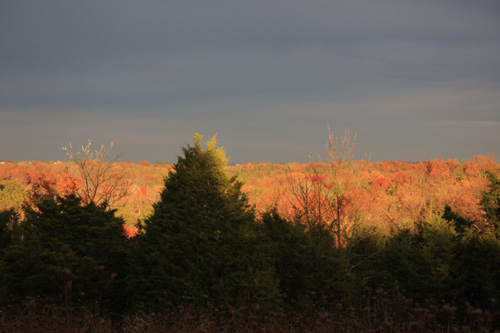
Shadows and light in autumn color
(*photo
credit)
November 27, 2009
Learn to Count Calories
What better day to consider
our calorie intake that we have and to be more on the alert about
possible overweight. What's not listed here, can be found on food
packages.
  
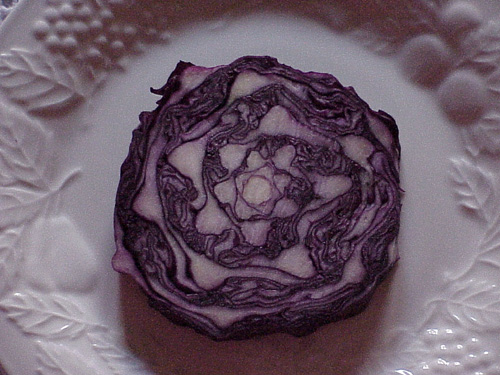
Red cabbage, nature's work of art
(* photo by Sally
Ramsdell)
November 28, 2009 Make
Proper Food Choices
America's major days of
traditional foods (turkey, pumpkin pie, cranberry sauce, etc.) is
Thanksgiving and "leftovers" day. Thus as these foods are behind us
we look beyond for choices when we eat out. Since many folks suffer
from obesity and other health problems, we ought to think nutrition
in meals out:
Top choice: When
food is accompanied by water instead of sugary soft drinks, a meal
can have a greatly reduced calorie content (see yesterday's Calorie
Counter), even though the fast food places may make water less
accessible than profitable sodas. If soft drinks come with the
meal, choose a diet drink. Water can replace the desire for an
additional double or triple helping.
Item choices: The
choices can be quite important, as is shown on the above listing of
meats and even soups and vegetables. A serving of baked beans has
several times the calorie content of other choices, which may prove
just as enjoyable and filling. The same applies to creamed soups as
opposed to non-creamed varieties.
Sweet choices:
Desserts are usually what do us in. Think about the pie choices at
Thanksgivings past! On rare occasions, as on that feast we may take
a calorie-loaded selection, but what really counts are day-by-day
choices over time. Fresh fruit is far better than sweet desserts;
fruit is filled with nutrition and better types of sugars. Even the
selection of the type of pie makes some difference, but that is
generally marginal compared to eating fresh fruit. A choice of
cheese cake (200 calories for a 2" piece) is better than a piece of
chocolate cake with icing (2" piece), which has an astounding 445
calories. Angel food cake of the same size has only 110
calories.
Vegetable choices:
Most of us know that vegetables are available much of the year in
fresh or at least in frozen and canned form. However, it is
fashionable, especially among youth to reject them in whatever
fashion. Many cooks regard pasta choices as faster to fix and to
fill hungry stomachs. How about more vegetables to replace these
standard American menu items? With all our resources, America has
rather limited menus, and fast food places know it. Salads and
vegetables make good meals, and schools and homes are getting the
message -- finally.
Salad Dressing choices:
A salad by itself contains very few calories, but many prefer
garnishing it with something interesting -- and that is where we
find the calories. For instance, a chef salad with regular oil (1
tbl) is 160 calories, whereas with dietetic dressing it is 40
calories. The same salad with an equal amount of mayonnaise is 125
calories; with Roquefort, Russian or French dressing, it is 105
calories.
Prayer:
Lord, you endow us with freedom; inspire us to use that freedom wisely in all
things, and especially when we choose the foods we are to eat.
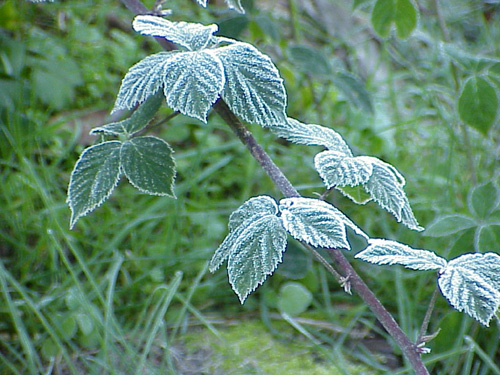
Jack Frost nipping the blackberry
(* photo by Sally
Ramsdell)
November 29, 2009
Consider Advent Celebrations
Advent and a new Church
year start today. During this holy season we each ought to consider
doing something very special to give it more than a time of
Christmas gift purchases. Let's strive to bring Christ back into
Christmas throughout Advent.
Light the Advent Wreath
-- This spiritual symbol of Christ's coming originated in the Middle
Ages through hanging wooden ox cart wheels in a rather dry location
near the home fireplace, so they wouldn't warp in the wet winter
weather. These were decorated with Christmas foliage and candles as
the season progressed, adding candles as the days got shorter and
the nights longer. Today, we make wreaths from evergreen boughs and
among them place four candles, three purple, the major Advent color,
and the fourth rose for the joy of the third Sunday of Advent. An
additional one is lit with each successive week.
Link Christmas
decorations with Advent -- Ask the question amid the
decorations, "Who is coming at Christmas?" Advent prepares us to
experience a more spiritual Christmas expectancy through the
readings of the Old Testament. Install a crib instead of reindeer
and Santas. Let festive lights focus in on the importance of that
crib scene. If commercial decorations appear early, so ought the
spiritual ones during the preparatory season.
Integrate caroling with
Advent songs -- Include Advent hymns in the choral singing and
caroling. Why should some beautiful Advent songs be reserved for
the Church or liturgical settings alone? They may be sung as well
with the standard Christmas ones.
Provide for children's
celebrations -- Bring in the concept of Mary and Joseph looking
for a place to stay, as Spanish families do in their Posadas.
This may be a perfect time to intermingle Hispanic and Anglo culture
in an integrated gathering and take time to explain the origins of
the celebration.
Prepare a special
Advent dish -- Several nationalities have their own special
foods, especially in relation to fasting from meat. At home, my
mother would make homemade noodles (from flour and eggs) or Alsatian
Spaezel in the handed-down recipes that were served with
tomato sauce.
Link Advent to Earth
themes -- We all await the healing of our wounded Earth and the
coming of a New Heaven and New Earth. That expectancy is really
part of the Advent liturgy. We should anticipate a future Earth of
justice and peace among all the people and all creatures. Can't we
dream of an Earth where all have affordable housing, adequate food,
potable water, a sound education and basic health needs satisfied?
Advent means the coming of peace.
Prayer:
Lord, come to us in a special way this Advent to make it a spiritual
experience for us all here and now.

The "wooly bear" - an early prediction for
winter's weather
(*photo
credit)
November 30, 2009
Accept the Coming of Winter
For many children and a
sprinkling of adults, the approaching December brings thoughts of
snow, ice skating, Christmas gifts, jingle bells, green and red
decorations, and all the good things of the season. For others, but
not all of us, the days of dreary November are now past and we look
forward with less enthusiasm but some hope to "the winter months."
As we grow older, we find winter weather harder to endure than even
the "global warming" summers. Perhaps there are things to break the
spell of hardship ahead and we should look for these in hope.
Freedom: With the
heavier layers of winter clothing, we think of ourselves as not
being free. Not so. We are free of mosquitoes for another few
months, hornets, wasps, snakes, and other creeping and crawling
varmints. We are free of sunscreen and sunburns, air conditioners and their
accompanying respiratory difficulties, overly hot cars and bedrooms,
stagnant ponds with green algae, dried out or overgrown lawns,
leaves in the gutters, and vehicle noises at all hours of the
night. Summer is gone for awhile.
Coziness: In what
other season can one become so contented? The snow is falling and
we can go nowhere for a short while. A cloak of fuel-saving snow
blankets the house and allows us to concentrate on a good book or
movie. Just stay put and contented.
Friendliness:
Summer has its parties but there's something nice about the
Salvation Army kettle, the caroling in the nursing home, the tinsel
and string of lights on homes we totally overlook at other times of
the year. There's a demand that we say "hello," when we would have
passed people by at other times. Winter demands communication in
ways that other seasons can omit.
Variety: Cooking
can be a fine art especially in winter. That's when variety is
fine-tuned for people who lack summer's fresh produce. This is the
time to bake cakes and prepare candy, try new soups and salads, open
up the root cellar and canned goods, get out the nut cracker, make
popcorn and, more rarely, kill hogs, resulting in sausage and other
pork dishes.
Slower pace:
Winter is supposed to be a slower time and not to involve much
travel. When we decide to avoid a distant event, we make room to
stay home. Winter is when we can think about things needing added
concentration.
Anticipation:
Winter is the beginning of a new growing season, and so our thoughts
turn to the increase in light in late December, and the stirring of
the Earth itself. We will soon be beginning a new year, and the old
will be behind us. This is the time of hope starting with Advent.
We are preparing for new life, and that is something to truly look
forward to. Bring on December!
Prayer:
Lord, allow us to take on each season as it comes, knowing full well
that each has a goodness worth appreciating.
|